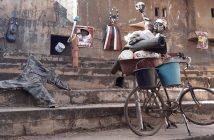There is something deeply moving about the last work of this filmmaker, sadly deceased in 2006: conscious of his illness but never letting it show during the shooting, Henri Duparc made Caramel in guise of a farewell. He did make it like a pompous and pretentious testament for all that, quite the opposite: once more, he contents himself with zooming, like in the opening shot, in Abidjan, the city that became the home of this mixed-race Guinean man who found roots and success there. Anxious to maintain a direct relation with the public and conscious of the changes in distribution in a city where cinemas have shut down, he adopts a television style multiplying reverse angle shots in the dialogue and readily framing the faces of his protagonists. True to his usual derision that draws from a close observation of the milieu, the never-ending linguistic inventions of Ivorian French and the vaudeville of Ivory Coast theatrical comedies, he caricatures characters and situations as always to better produce a counter-discourse to topical issues, denouncing intolerance and foolishness. But this parody always respects its characters who retain all their humanity, the only way to suggest that spectators look at their real selves and change. Thus, in Caramel, Maria is moving while being the sum total of all the flaws of the zealously religious who want do good for others in spite of themselves while imprisoning them in their way of thinking. She swings her imposing bottom about, grimaces and retorts nineteen to the dozen, making the audience split its sides laughing, and schemes to find a good match for her brother Fred by calling up her girlfriends who stop at nothing, like Léa who chats him up while eating, drinking and cooing, giving all she’s got, or Patricia who tries to compromise him through various intermediary means. Of course, when Fred meets the young and pretty mixed-race Caramel under his own steam, Maria instantly demonizes her.
Fred meets Caramel in the cinema he runs. For cinema plays an unexpectedly important role in the film and it progressively becomes clear how much Caramel refers to Henri Duparc’s career, not in a biographical way but by pointing out his attempts, failures and commitments. His films posters are pinned on the walls and excerpts from Abusuan, L’herbe sauvage, Bal poussière (Dancing in the Dark) and Couleur Café contribute to the narrative. Fred, who drives a car decorated with the slogan « Cinema makes us dream » in big letters- a battle dear to Duparc-, commits himself entirely, convinced that he will bring in more money for his cinema that is in jeopardy due to a lack of spectators by organizing an « African cinema » week. On the programme: Abusuan, Camp de Thiaroye (Camp of Thiaroye), Koudou, nothing but historical gems, but also spearheads of a thematically and aesthetically self-focused cinema. It is known that Henri Duparc took over Le pharaon, an Abidjan cinema, with the intention of screening mainly African films but that he had to close down because of the devaluation of the CFA franc which increased the costs while diminishing the revenues. But Fred also schedules Mangala, fille des Indes, a repeatedly run Indian cinema classic particularly popular amongst African women, making them dream and confirming their desire for cinema. It is to see this film that the beautiful Caramel comes to the cinema and doesn’t miss a showing. She is, then, the fulfillment of Fred’s ambition. It is not surprising, therefore, that he should fall in love with her, even though he is already sleeping with Tatiana, a TV repairer he visits only when he has the time and wants to relax over a nice meal!
His love for Caramel takes him far- beyond reality- in a world that cinema sometimes dares to tackle with humour like in Ghost (Jerry Zucker, 1990, starring Whoopi Goldberg) or Always (Steven Spielberg, 1989): how the dead watch over the living. It’s a way of saying that, by allowing us to dream, cinema- like love- allows us to surpass and transcend ourselves. But it is also a way of reminding us that, as Duparc himself said, « the only tragedy for an individual on earth is death, and beyond that, everything else is just a human comedy! »








